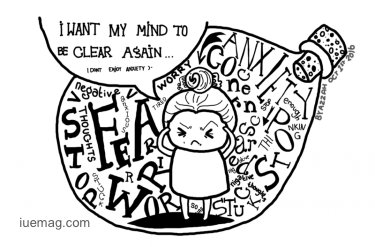

4 Ways to Manage Restless Anxiety

Even though anxiety can eat away at your hope, don’t let your symptoms speak for you. Here are some worthwhile ways to manage your anxiety:
Transcranial Magnetic Stimulation (TMS)
TMS is a treatment in which a licensed professional places an electromagnetic coil on your scalp and distributes magnetic energy into your brain, thus signaling nerve cells in the brain. The reason this signal can help you cope with anxiety is that it stimulates parts of your brain that have low levels of activity.
This treatment can also repair areas of decreased connectivity between the brain’s frontal and limbic regions. TMS improves the functionality of your brain and helps regulate your emotions. These treatments typically last around 40 minutes and patients receive several of them over the course of a prescribed period of time.
TMS for anxiety could be the treatment that finally helps you manage your anxiety. Don’t hesitate to do your own research and contact centers who administer the treatment.
Get Educated
Educating yourself about the causes and symptoms of anxiety is an important part of coping with it. If you struggle anxiety, gathering as much knowledge as you can about it may help you fight it. If you don’t understand the problem, how can you possibly treat it?
No matter where you are in your bout with anxiety, education can help you. If you’re already seeking out treatment, ask your mental health care providers about anxiety. If you haven’t yet sought out treatment, do your own research about the disorder.
And, remember that mental illnesses are just as legitimate as physical illnesses. Stigmatizing your illness will only prevent you from managing it. If you invalidate your emotions, you may even end up worsening your anxiety.
Exercise
If you are just dealing with the general anxiety that you don’t feel like you need treatment for, exercise can be a great way to reduce those symptoms without seeing a professional. The reason exercise helps with anxiety is because it released endorphins. Endorphins are neurotransmitters that interact with your brain’s opiate receptors
On a less scientific note, exercise is a pleasant distraction. Setting goals for yourself and maintain a healthy lifestyle is a great way to deal with anxiety. Putting your energy into a positive space will serve you well.

That said, you shouldn’t rely on exercise if your symptoms are severe. Always consult a professional if you feel like your anxiety is out of control and you’re unable to manage it.
Try Medication
Not everyone is comfortable with medicating themselves for anxiety. Although, don’t rule it out completely. If you are resistant to any other treatments, medication may be the thing that actually helps you. There’s nothing wrong with admitting this.
Antidepressants are used to balance the chemicals in your brain. If you don’t have balanced levels of dopamine, norepinephrine, or serotonin, you can develop unrelenting symptoms of anxiety. The most effective way to regulate these chemicals is through the use of antidepressants.
There are so many different types of antidepressants, meaning that the first few that you try may not work as well for you as they might work for someone else. This doesn’t mean that you’re hopeless. It just means that you need to explore your options. There are also some potential side effects to consider:
· Weight gain
· Decreased sexual drive
· Nausea
· Insomnia
· Fatigue Whatever method you choose to treat your anxiety, consult a mental health professional before to ensure you have all of the facts.
Copyrights © 2026 Inspiration Unlimited - iU - Online Global Positivity Media
Any facts, figures or references stated here are made by the author & don't reflect the endorsement of iU at all times unless otherwise drafted by official staff at iU. A part [small/large] could be AI generated content at times and it's inevitable today. If you have a feedback particularly with regards to that, feel free to let us know. This article was first published here on 3rd September 2019.
Want to Publish About Your Business / Achievements
Let's Discuss Right Away!

All chats are end-to-end encrypted by WhatsApp and won't be shared anywhere [won't be stored either].

